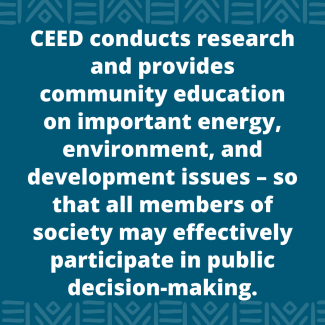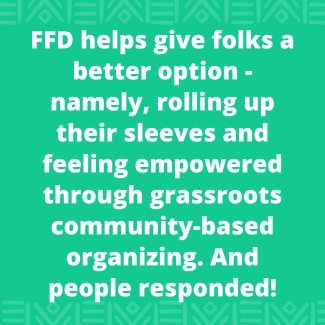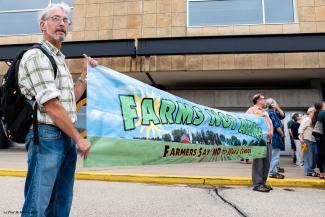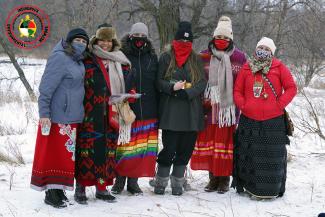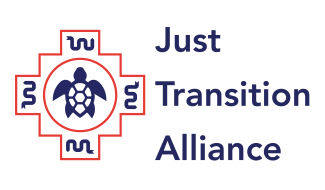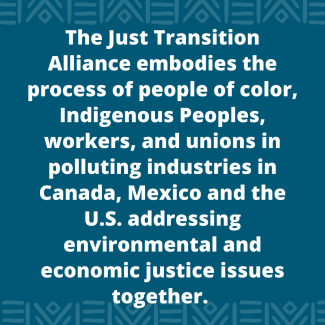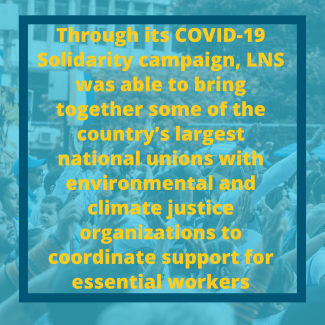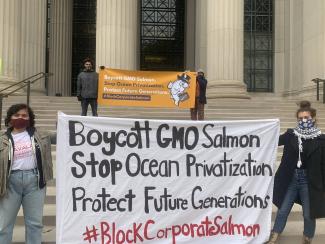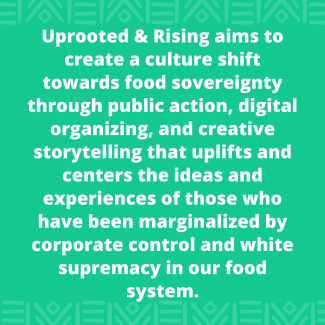2020 National Organizations Spotlight Series
We are highlighting the dynamic work of 2020 BEA Fund grantees as part of a multimedia series that will include written features sent to our listserv, social media and here on the website.
Read about our BEA Fund Grantee Spotlight organizations below.
- Center for Earth Energy and Democracy (CEED)
-
Center for Earth Energy and Democracy’s (CEED’s) mission is to ensure that communities and policy makers have the tools and information they need to create just, sustainable energy and environmental policy. Working in collaboration with grassroots communities, policy makers and researchers, CEED conducts research and provides community education on important energy, environment, and development issues – so that all members of society may effectively participate in public decision-making.
Through coordination of the Equitable and Just National Climate Platform (EJNCP) and the Midwest Environmental Justice Network, CEED has been able to offer space for collaboration and movement building. These coalition spaces have been key to shifting narratives around what equitable climate policy looks like at the federal, state and local levels. Through EJNCP, CEED has been able to collectively advocate for EJ specific spending in economic recovery packages as well as ask for accountability around how programs in EJ communities are implemented.
CEED and the EJNCP coalition partners were able to hold meetings with key congressional committees, federal agencies to advocate for a whole of government approach into addressing equity and environmental justice.
- Family Farm Defenders (FFD)
-
The mission of Family Farm Defenders (FFD) is to create a farmer-controlled and consumer-oriented food and fiber system, based upon democratically controlled institutions that empower farmers to speak for and respect themselves in their quest for social and economic justice. To this end, FFD supports agroecology, farm and food worker rights, racial justice, animal welfare, consumer safety & right to know, fair trade – both globally and domestically, as well as food sovereignty. FFD has also worked to create opportunities for farmers to join together in new cooperative marketing endeavors and to bridge the socioeconomic gap that often exists between rural and urban communities.
Public pressure against extreme fossil fuel extraction is growing in their bioregion and we have seen energy corporations forced to respond by shutting down coal plants and shifting to other more renewable energy alternatives like wind and solar. Their challenge now is to amplify the farmer voice against other false solutions to climate change like carbon trading, manure digesters on factory farms, "climate ready" GMO crop varieties. Thankfully, they have been speaking out against these ideas for many years already, so their opinion has gained some credibility within the media and among progressive elected officials.
The crisis of the pandemic really made people think about their priorities and to re(assess) who their true friends are and which new potential allies existed. FFD has seen this before with other natural/human disasters - people were not going to wait for the government to "rescue" them, especially when the state's response often just made the underlying systems of exploitation/oppression worse (disaster capitalism). So rather than slipping into cynical despair, FFD helped give folks a better option - namely, rolling up their sleeves and feeling empowered through grassroots community-based organizing. And people responded!
- Indigenous Environmental Network (IEN)
-
Established in 1990 within the United States, Indigenous Environmental Network (IEN) was formed by grassroots Indigenous peoples and individuals to address environmental and economic justice issues (EJ). IEN’s activities include building the capacity of Indigenous communities and tribal governments to develop mechanisms to protect our sacred sites, land, water, air, natural resources, health of both our people and all living things, and to build economically sustainable communities. IEN accomplishes this by maintaining an informational clearinghouse, organizing campaigns, direct actions and public awareness, building the capacity of community and tribes to address EJ issues, development of initiatives to impact policy, and building alliances among Indigenous communities, tribes, inter-tribal and Indigenous organizations, people-of-color/ethnic organizations, faith-based and women groups, youth, labor, environmental organizations and others.
The implementation of strengthening and healing the nation-to-nation relationship with Indigenous nations through systemic changes in US policies is necessary to honor and strengthen its Trust Responsibilities to Indigenous Nations, with specific attention to environmental and social issues. It also calls on reversing the erosion of sovereignty of Indigenous Nations and advancing policies that reflect the nuanced relationships between our Nations.
One key factor leading to the progress in the area is IEN’s ability to lift up and amplify the voices of grassroots organizations and communities by maintaining close-knit relationships with folks on the ground while simultaneously holding space at national policy tables. In that way, IEN creates inroads into policy-making for those who are most oftentimes marginalized and left out of the conversation. This requires a great degree of diplomacy to balance cooperation and collaboration while maintaining strict red lines on non-negotiable issues when we are pressured to compromise. It also requires constant reiteration of the need for inclusion and equity in spaces that have historically been dominated by cis white male influence.
- Just Transition Alliance (JTA)
-
The Just Transition Alliance (JTA) was founded in 1997 as a coalition of environmental justice networks and labor unions. Together with frontline workers and community members who live along the fence-line of polluting industries, they create healthy workplaces and communities. JTA focuses on production (Cradle to Cradle production) and local/regional economies to scale. Together, the Just Transition Alliance embodies the process of people of color, Indigenous Peoples, workers, and unions in polluting industries in Canada, Mexico and the U.S. addressing environmental and economic justice issues together.
Recently JTA has been able to advise the Biden/Harris Transition Team and they have been a core part of the team that has moved the Biden/Harris Administration to address Environmental and Economic Justice issues further than in any other administration in US history. Environmental Justice organizations have made tremendous inroads on proving and codifying our plight with many facets of policy, lawsuits against the past administration and establishing our leaders in positions where we expect to make drastic change at both federal and state levels.
- Labor Network for Sustainability (LNS)
-
The mission of the Labor Network for Sustainability (LNS) is “to build a powerful labor-climate movement to secure an ecologically sustainable and economically just future where everyone can make a living on a living planet.”
During the pandemic, despite the inability to meet people in person they were able to organize activities that allowed them to build important relationships throughout the year. Through its COVID-19 Solidarity campaign, LNS was able to bring together some of the country’s largest national unions with environmental and climate justice organizations to coordinate support for essential workers. LNS also conducted a Just Transition Listening Project that was truly inspiring. A diverse team of organizers and researchers from spent quality time learning the histories of labor and community leaders across the country who organized in the face of major job losses in their communities. These transitions too often had devastating impacts when workers and their communities were treated as stranded assets. Transit Equity also continues to be a source of pride for LNS. It is an incredibly diverse effort that spans various constituencies from transit riders to disability and civil rights organizations, faith groups to labor unions, students to seniors. Transit equity groups are active in geographic regions that are usually not recognized in climate dialogues, particularly in communities in the South and Midwest like Atlanta, GA, Nashville, TN, Columbia, South Carolina, Pittsburgh, PA, Cleveland, OH and many others.
The Labor Network for Sustainability is also working to lift up the voices of young workers to reshape the narrative on climate and labor through its Young Worker Listening Project. They think this will have important long-term implications for building the labor-climate movement.
- Uprooted and Rising
-
Uprooted & Rising aims to create a culture shift towards food sovereignty through public action, digital organizing, and creative storytelling that uplifts and centers the ideas and experiences of those who have been marginalized by corporate control and white supremacy in our food system. The movement includes students, workers, faculty, food producers, and community members that institutions of higher education are meant to serve.
One of Uprooted & Rising’s current campaigns is to mobilize against the development and release of Genetically Engineered (GE) salmon, which is a major new threat in our food system. In addition to being the first GE animal, it represents a joining of industrial aquaculture and industrial agriculture (specifically Cargill) working to privatize oceans and take greater control of fisheries. The #BlockCorporateSalmon coalition of Indigenous salmon protectors, NGOs and student and community activists (via UNR) has brought people power to the fight against GE salmon that has been mostly fought through legal challenges. Uprooted and Rising along with this coalition are moving big buyers in the food system like Aramark to commit never to buy GE salmon. They need to send a message to investors that GE salmon is a bad investment, and to politicians that the policy changes required to make it viable are unpopular.
